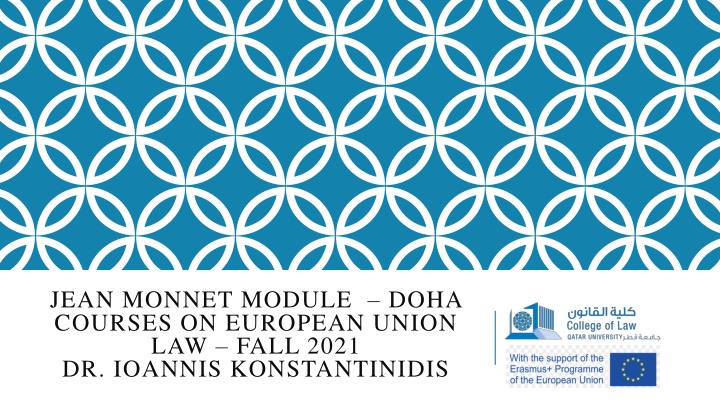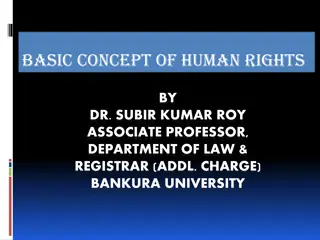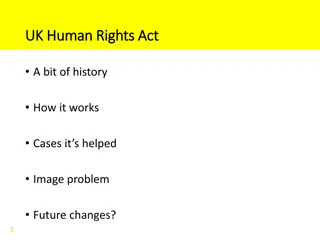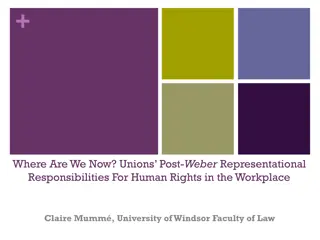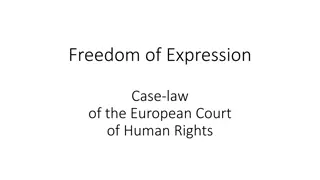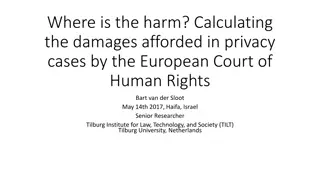EU Charter of Fundamental Rights and European Convention on Human Rights Overview
The course module on European Union Law in Doha focuses on the EU Charter of Fundamental Rights and its relationship with the European Convention on Human Rights. It covers topics such as the EU's accession to the Convention, external action on human rights, and the differences between the Charter and the Convention. Negotiations for the EU's accession began in 2010. The European Convention of Human Rights, established after WWII, includes an international court to enforce rights. Students gain an advanced understanding of these key aspects.
Download Presentation

Please find below an Image/Link to download the presentation.
The content on the website is provided AS IS for your information and personal use only. It may not be sold, licensed, or shared on other websites without obtaining consent from the author.If you encounter any issues during the download, it is possible that the publisher has removed the file from their server.
You are allowed to download the files provided on this website for personal or commercial use, subject to the condition that they are used lawfully. All files are the property of their respective owners.
The content on the website is provided AS IS for your information and personal use only. It may not be sold, licensed, or shared on other websites without obtaining consent from the author.
E N D
Presentation Transcript
JEAN MONNET MODULE DOHA COURSES ON EUROPEAN UNION LAW FALL 2021 DR. IOANNIS KONSTANTINIDIS
COURSE 2: THE EU CHARTER OF FUNDAMENTAL RIGHTS WEEK 6 I. The Accession of the European Union to European Convention on Human Rights II. The External Action of the European Union and the Question of Human Rights The Example of Trade Agreements III. Concluding Remarks
WEEK 6 Learning Outcomes: On completion of this week, students should Have developed an advanced understanding of the relationship between the EU Charter of Fundamental Freedoms and the European Convention on Human Rights Have developed an advanced understanding of the the EU External Action and the question of human rights
I. THE ACCESSION OF THE EUROPEAN UNION TO EUROPEAN CONVENTION ON HUMAN RIGHTS EU Charter vs European Convention on Human Rights Convention - What's the Difference?
I. THE ACCESSION OF THE EUROPEAN UNION TO EUROPEAN CONVENTION ON HUMAN RIGHTS Background to Accession The Lisbon Treaty introduced a new Article, which provides: The Union shall accede to the European Convention for the Protection of Human Rights and Fundamental Freedoms. Such accession shall not affect the Union s competences as defined in the Treaties.
I. THE ACCESSION OF THE EUROPEAN UNION TO EUROPEAN CONVENTION ON HUMAN RIGHTS Background to Accession Negotiations for accession started in June 2010 and are ongoing
I. THE ACCESSION OF THE EUROPEAN UNION TO EUROPEAN CONVENTION ON HUMAN RIGHTS Background to Accession The European Convention of Human Rights (ECHR) is a charter of rights adopted in the aftermath of the Second World War by the Council of Europe, a body distinct from, and of much wider composition than, the EU In order to ensure that the Convention would have teeth , the contracting parties set up an international court, the European Court of Human Rights (ECtHR) entrusted with interpreting the ECHR and holding the contracting parties to account Cases before the ECtHR can be brought by individual parties Individuals must have exhausted domestic remedies before being able to bring a case before the ECtHR
I. THE ACCESSION OF THE EUROPEAN UNION TO EUROPEAN CONVENTION ON HUMAN RIGHTS Background to Accession From the very first cases concerning human rights protection in the (then) EEC, the European Court of Justice stated that it would draw inspiration also from the ECHR, and that this document had special importance for the EU Furthermore, in interpreting fundamental rights, the European Court of Justice looks at the jurisprudence of the ECtHR and whilst discrepancies in the interpretation given by the two courts have occurred, those have not been intentional
I. THE ACCESSION OF THE EUROPEAN UNION TO EUROPEAN CONVENTION ON HUMAN RIGHTS Background to Accession The ECHR is already part of EU public law: it is mentioned in the Treaties and it is applied through the case law of the European Court of Justice However, the fact that the EU is not a party to the ECHR raises very serious legal and political issues
I. THE ACCESSION OF THE EUROPEAN UNION TO EUROPEAN CONVENTION ON HUMAN RIGHTS Background to Accession It excludes the jurisdiction of the ECtHR over the EU; and Respect for human rights is a precondition for joining the EU and yet the EU does not subject itself to any external scrutiny of its fundamental rights compliance
I. THE ACCESSION OF THE EUROPEAN UNION TO EUROPEAN CONVENTION ON HUMAN RIGHTS EU s Accession In 1996, the European Court of Justice gave its first opinion on the EU s accession to the ECHR (Opinion 2/94). At the time, the court ruled that the European Community did not have the competence to accede to the ECHR (paras 34-35) A legal basis for the accession was established when the Lisbon Treaty entered into force in 2009. Article 6(2) states that the EU shall accede to the ECHR and hence, creates a legal obligation
I. THE ACCESSION OF THE EUROPEAN UNION TO EUROPEAN CONVENTION ON HUMAN RIGHTS EU s Accession The 14th Protocol to the ECHR paved the way for the accession by introduction of Article 59(2) ECHR declaring that the EU may accede to the ECHR In 2013, the draft Accession Agreement was submitted to the European Court of Justice to obtain an opinion on the compatibility with the treaties
I. THE ACCESSION OF THE EUROPEAN UNION TO EUROPEAN CONVENTION ON HUMAN RIGHTS EU s Accession In the following year, the court delivered the famous Opinion 2/13 and despite significant arguments in favor of an accession, concluded that the draft Accession Agreement was incompatible with EU law (para 258): EU s special characteristics, co-respondent system, inter-State cases etc. Interestingly, the European Commission, supported by observing Member States (para 109), advocated the opposite position (para 73)
I. THE ACCESSION OF THE EUROPEAN UNION TO EUROPEAN CONVENTION ON HUMAN RIGHTS EU s Accession In late 2019, the EU and the Council of Europe announced their willingness to proceed with the negotiations on the EU s accession
I. THE ACCESSION OF THE EUROPEAN UNION TO EUROPEAN CONVENTION ON HUMAN RIGHTS EU s Accession A Work in Progress Will the revised Accession Agreement again be subject of an opinion by the European Court of Justice? The ECtHR could also be asked to give its opinion on the agreement
II. THE EXTERNAL ACTION OF THE EUROPEAN UNION AND THE QUESTION OF HUMAN RIGHTS
II. THE EXTERNAL ACTION OF THE EUROPEAN UNION AND THE QUESTION OF HUMAN RIGHTS Human Rights in the EU s Bilateral and Regional Trade Agreements To date, the EU has concluded and is in the process of negotiating an array of international trade agreements Since the 1990s, it has been a policy of the EU that all framework agreements concluded with third countries such as Association Agreements, Partnership Agreements and Cooperation Agreements should include a human rights clause
II. THE EXTERNAL ACTION OF THE EUROPEAN UNION AND THE QUESTION OF HUMAN RIGHTS Human Rights in the EU s Bilateral and Regional Trade Agreements These agreements provides that the respect for human rights, democracy and the rule of law constitutes the basis for the agreement and represents the essential element of the agreement on which the reciprocal obligations of the parties are premised, so that human rights violations of a certain scale by one of them can amount to a material breach of the agreement and justify suspension or other countermeasures
II. THE EXTERNAL ACTION OF THE EUROPEAN UNION AND THE QUESTION OF HUMAN RIGHTS Human Rights in the EU s Bilateral and Regional Trade Agreements There are clear patterns in the drafting of the essential elements clause These clauses have evolved over the years and can be grouped by country and/or regional bloc
II. THE EXTERNAL ACTION OF THE EUROPEAN UNION AND THE QUESTION OF HUMAN RIGHTS Human Rights in the EU s Bilateral and Regional Trade Agreements There is also a non-execution clause stating that in the event that one party fails to comply with its obligations, the other party is able to adopt appropriate measures According to the Commission, sanctions under the clause should be reserved only for the most extreme and flagrant violations of human rights
II. THE EXTERNAL ACTION OF THE EUROPEAN UNION AND THE QUESTION OF HUMAN RIGHTS Human Rights in the EU s Bilateral and Regional Trade Agreements Example, the EU Colombia and Peru Trade Agreement: any Party may immediately adopt appropriate measures in accordance with international law in case of violation by another Party of the essential elements referred to in Articles 1 and 2 of this Agreement
II. THE EXTERNAL ACTION OF THE EUROPEAN UNION AND THE QUESTION OF HUMAN RIGHTS Human Rights in the EU s in the New Generation of Association Agreements (AA) Examples: Agreements with Ukraine, Georgia and Moldova (2014) These agreements represent the most extensive form of cooperation offered by the EU to its non-candidate neighbors
II. THE EXTERNAL ACTION OF THE EUROPEAN UNION AND THE QUESTION OF HUMAN RIGHTS Human Rights in the EU s in the New Generation of Association Agreements (AA) The human rights clauses included in these agreements are conceived differently in comparison with the human rights clauses included in simple trade agreements due to the legal and political specificities of these countries Out of the three agreements the EU-Ukraine AA stands out not only for its comprehensiveness and complexity but particularly for its strict conditionality
II. THE EXTERNAL ACTION OF THE EUROPEAN UNION AND THE QUESTION OF HUMAN RIGHTS Human Rights in the EU s in the New Generation of Association Agreements (AA) An extensive list of international instruments constitutes the basis for the essential elements that the parties must respect in their domestic and foreign policies In addition to the Universal Declaration of Human Rights, the essential elements clauses make references to the European Convention on Human Rights and other human rights related instruments Moreover, the essential elements clauses in all three AAs require the respect of human rights by the contracting parties both in their domestic and external policies
III. CONCLUDING REMARKS Despite the complexities, there is no doubt that the EU accession to the ECHR will be a positive step and will ensure that the EU is bound by the same rules that bind its Member States and its international partners EU s practice of linking economic benefits to human rights conditionality is clearly the standard modus operandi of the EU. Is its effectiveness uniform ?
